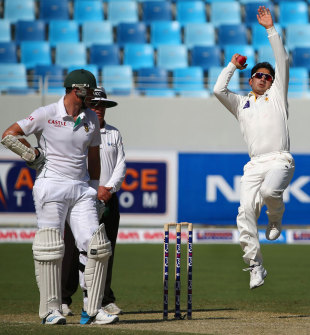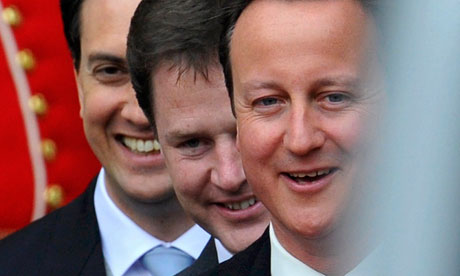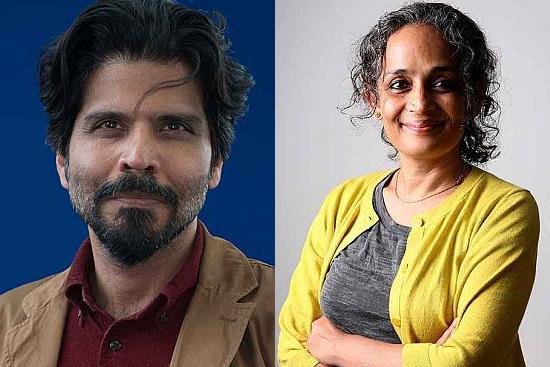Umar Farooq's interview with Saeed Ajmal in Cricinfo
Everyone in Pakistan either wants to be a fast bowler or a batsman. How did you end up a spinner?
I was a fast bowler until 15. I used to play mostly with a tennis ball covered in vinyl electrical tape. My school captain Maqsood Ahmed encouraged me to try off spin. He felt I might be more successful as a spinner. He probably noticed that my height and build weren't good for fast bowling. It was a breakthrough. So here I am.
I was a fast bowler until 15. I used to play mostly with a tennis ball covered in vinyl electrical tape. My school captain Maqsood Ahmed encouraged me to try off spin. He felt I might be more successful as a spinner. He probably noticed that my height and build weren't good for fast bowling. It was a breakthrough. So here I am.
What does cricket mean to you?
Cricket is a tough game. I would say 90% of the time it makes you cry, but the 10% that forms the good parts is truly worth it. The key to success, I think, is to bear the bad days with a smile. If you can do that, the good days become more and more frequent.
Cricket is a tough game. I would say 90% of the time it makes you cry, but the 10% that forms the good parts is truly worth it. The key to success, I think, is to bear the bad days with a smile. If you can do that, the good days become more and more frequent.
You made a relatively late entry into international cricket, playing your first Test when nearly 32. How come?
I cannot tell why I took so long and who and what were the forces that delayed my entry into international cricket. I'd rather focus on my present and future rather than cursing my past. God has given me this personal quality of shrugging off failure quickly and not taking disappointments to heart. That's just the way I am and this approach has helped me greatly in life. I simply refuse to be disappointed.
I cannot tell why I took so long and who and what were the forces that delayed my entry into international cricket. I'd rather focus on my present and future rather than cursing my past. God has given me this personal quality of shrugging off failure quickly and not taking disappointments to heart. That's just the way I am and this approach has helped me greatly in life. I simply refuse to be disappointed.
How did you master the doosra?
I learned to bowl the doosra by watching video footage of Saqlain Mushtaq's bowling during my days in England playing league cricket. I never got any direct tips from him but I closely studied him bowling the doosra on video.
I learned to bowl the doosra by watching video footage of Saqlain Mushtaq's bowling during my days in England playing league cricket. I never got any direct tips from him but I closely studied him bowling the doosra on video.
But way before that, Aqeel Ahmed, who played for Faisalabad, could bowl a pretty good one. Variation is a key weapon for any spinner. I used to watch Aqeel take wicket after wicket with his doosra and I wanted to do the same. I felt confident that if he can do it I could too.
Is it still a problem for you to bowl to left-handers?
During the early phase of my career it was. It had almost become a mental block. Left-handers are supposed to be fearful of offspinners, but I could see that I wasn't making them afraid. It became very frustrating for me and I knew I had to do something about it. I thought to myself, I have this ball in my hand, that's my biggest weapon; why am I not able to use this weapon effectively against left-handers? I worked hard at the problem, going to the nets and bowling at left-handed batsmen for long periods. Allah was kind and I was able to work out my deficiencies. Over the last year and a half to two years, it has ceased to be a problem. I came at the problem with a positive mental attitude. I fine-tuned my doosra for left-hand batsmen.
During the early phase of my career it was. It had almost become a mental block. Left-handers are supposed to be fearful of offspinners, but I could see that I wasn't making them afraid. It became very frustrating for me and I knew I had to do something about it. I thought to myself, I have this ball in my hand, that's my biggest weapon; why am I not able to use this weapon effectively against left-handers? I worked hard at the problem, going to the nets and bowling at left-handed batsmen for long periods. Allah was kind and I was able to work out my deficiencies. Over the last year and a half to two years, it has ceased to be a problem. I came at the problem with a positive mental attitude. I fine-tuned my doosra for left-hand batsmen.
Do you fear that overusing the doosra might make you predictable?
I don't think I overuse it. When I look at the left-handers I've dismissed over the last two years, 70% have fallen to the doosra. I use it because it works. To me, that's effective use, not overuse. If I find that a batsman is uncomfortable against the doosra, I'll bowl exactly that to him, even if I end up bowling ten doosras in a row.
I don't think I overuse it. When I look at the left-handers I've dismissed over the last two years, 70% have fallen to the doosra. I use it because it works. To me, that's effective use, not overuse. If I find that a batsman is uncomfortable against the doosra, I'll bowl exactly that to him, even if I end up bowling ten doosras in a row.
We heard you were offered the Pakistan captaincy.
I don't want to put myself forward for captaincy. I think I am better as a team player. I do think about being captain of Pakistan, but I am reluctant too. Captaincy in Pakistan is not easy. The captain ends up being blamed for anything that goes wrong. Just look at Mohammad Hafeez. He resigned after our exit from this year's World T20. Why? It's because all the blame was being dumped on him. I have been approached for captaincy but I declined. I want to be relaxed about my cricket. God has blessed me with a sunny disposition and I want to keep it that way.
I don't want to put myself forward for captaincy. I think I am better as a team player. I do think about being captain of Pakistan, but I am reluctant too. Captaincy in Pakistan is not easy. The captain ends up being blamed for anything that goes wrong. Just look at Mohammad Hafeez. He resigned after our exit from this year's World T20. Why? It's because all the blame was being dumped on him. I have been approached for captaincy but I declined. I want to be relaxed about my cricket. God has blessed me with a sunny disposition and I want to keep it that way.
Misbah-ul-Haq has been outstanding in this role. In fact, when you consider the circumstances in which he has performed his job, I would say his services as captain are greater than even Imran Khan's. Yet he doesn't always receive his due. He's been a tremendous leader during an extremely difficult time for Pakistan and he's been our leading run getter. Yet each time we lose a match, people forget about his magnificent contributions. They start demanding that he be dropped. I really fail to understand this. Even as a batsman, people complain he's too slow, that he blocks a lot, does a lot of tuk-tuk. This is not fair to Misbah. He is a watchful batsman and becomes extra-watchful if the team is losing wickets from the other end, which often happens with us. His approach is appropriate and serves the interests of the team. I can tell you as a bowler that it pleases me greatly to see Misbah standing at the crease. If he is batting, it gives me heart that I will have runs to bowl at.
| "As a bowler that it pleases me greatly to see Misbah standing at the crease. If he is batting, it gives me heart that I will have runs to bowl at" | |||
Don't you think Misbah is over-reliant on you and that this keeps you under pressure all the time?
I agree that they rely heavily on me. This is a responsibility I accept with a sense of honour and humility. I am there to be used as and when my captain needs. I am never sure which overs I'm going to bowl, when I'm going to get called upon. I remain alert all the time, ready to serve. All I know is that whenever my captain calls on me, I have to give it everything. There was a time when I used to feel anxious that I could get called upon unpredictably, but I no longer feel any pressure about it.
I agree that they rely heavily on me. This is a responsibility I accept with a sense of honour and humility. I am there to be used as and when my captain needs. I am never sure which overs I'm going to bowl, when I'm going to get called upon. I remain alert all the time, ready to serve. All I know is that whenever my captain calls on me, I have to give it everything. There was a time when I used to feel anxious that I could get called upon unpredictably, but I no longer feel any pressure about it.
Cricket is a team game, so you obviously can't get five or ten wickets all the time. Others too have to respond to contribute.
Whether it's the first over or the last, whether the boundary is short or long, whether the batsman is new or well-set, I always answer the call of my captain. I would never say, hey, that's a short boundary over there, I don't want to bowl from this end. That's just not me. I have a sense of duty about it. Whenever I'm called upon, my answer always is, come on, give me the ball.
Whether it's the first over or the last, whether the boundary is short or long, whether the batsman is new or well-set, I always answer the call of my captain. I would never say, hey, that's a short boundary over there, I don't want to bowl from this end. That's just not me. I have a sense of duty about it. Whenever I'm called upon, my answer always is, come on, give me the ball.
You can never relax in cricket. You have to keep working at the game all the time, keep trying and learning new things. If you allow yourself to relax, you'll be swept away. It's an unpredictable game. You can never be sure of what's going to happen next. It can also be a cruel game. It can give you a lot of heartache.
You have never played Test cricket in your country. How does that feel?
It is perhaps the greatest misfortune of my career that I have been forced to play nearly all my international matches outside Pakistan. I have played over 200 international matches by now and only three have been in Pakistan. None of my 33 Tests has been in Pakistan.
It is perhaps the greatest misfortune of my career that I have been forced to play nearly all my international matches outside Pakistan. I have played over 200 international matches by now and only three have been in Pakistan. None of my 33 Tests has been in Pakistan.
I grew up watching many Tests at Iqbal Stadium, in my home town of Faisalabad, and used to dream of one day playing there myself. That has yet to happen. I can't say if it ever will. I am extremely keen to play in front of my own people. Few things would give me greater joy. I keep praying for the quick return of international cricket to Pakistan. If it happens after my retirement, it will leave me very sad indeed. I do agree that our team has nicely managed to adopt the UAE as a second home, but my heart still aches with the desire to play at home. I want to see the intensity of support I am able to attract here. That is something I would like to experience. We have played our so-called home matches in a number of locations, including the UAE, England, Sri Lanka, and even New Zealand. These locations have all been welcoming and provided top-notch facilities, but they aren't home. It's different when I come to Pakistan. Just breathing the air here makes me feel better.
As one of the world's top spinners, do you miss playing in the IPL?
No doubt it would be better for us if we could be included in the IPL. But the loss is only financial. We're all playing a good deal of cricket as it is, so we're not losing out on that count. But yes, Pakistani players fully deserve to be included in the IPL. I can understand why they might want to exclude us from matches inside India, but the IPL has now been exported to South Africa and the UAE. There should be no hesitation in including us when the games are being played outside India. I would even ask the IPL organisers to host matches in Pakistan. Why not? It would be good for the fans and our players would benefit. It will reveal the close bond and mutual affection that exists between Indians and Pakistanis. That is what should be allowed to truly define the relationship between our countries.
No doubt it would be better for us if we could be included in the IPL. But the loss is only financial. We're all playing a good deal of cricket as it is, so we're not losing out on that count. But yes, Pakistani players fully deserve to be included in the IPL. I can understand why they might want to exclude us from matches inside India, but the IPL has now been exported to South Africa and the UAE. There should be no hesitation in including us when the games are being played outside India. I would even ask the IPL organisers to host matches in Pakistan. Why not? It would be good for the fans and our players would benefit. It will reveal the close bond and mutual affection that exists between Indians and Pakistanis. That is what should be allowed to truly define the relationship between our countries.
There has lately been some talk about reviving bilateral series between India and Pakistan. I would love to see that. I dearly hope it happens.
You predicted you'd take a ten-wicket haul in Cape Town last year before the start of the match. How did you feel it coming?
The first thing I do whenever I arrive at any ground is to go look at the pitch. At the start of the Cape Town Test, a commentator and a TV cameraman were standing there doing a pitch report. When I saw the surface I couldn't help rubbing my hands in glee. The camera managed to get a shot of me rubbing my hands together. It appeared to be a pitch tailor-made for me. I can't explain it in words and I can't tell you what I saw in that pitch that made me feel this way, but I sensed I would be taking wickets.
The first thing I do whenever I arrive at any ground is to go look at the pitch. At the start of the Cape Town Test, a commentator and a TV cameraman were standing there doing a pitch report. When I saw the surface I couldn't help rubbing my hands in glee. The camera managed to get a shot of me rubbing my hands together. It appeared to be a pitch tailor-made for me. I can't explain it in words and I can't tell you what I saw in that pitch that made me feel this way, but I sensed I would be taking wickets.
It was just this realisation that arose from somewhere deep inside. It just happens that way sometimes in cricket. If you're a batsman, there are days when you'll play your first scoring shot and right away you can sense you'll be making a hundred today. That's the kind of feeling that Cape Town pitch gave me. I took ten wickets in that game, so it proved correct.
Did you lose faith in technology in cricket after Sachin Tendulkar was not given out off your bowling in the 2011 World Cup?
I was left dumbfounded when Hawk-Eye gave Tendulkar not out in the semi-final in Mohali. As I understand it, the way the system was set up back then, it was controlled by a producer who could influence the images. Now it has been improved and the technical people are required to present all the available angles to the third umpire without editing.
I was left dumbfounded when Hawk-Eye gave Tendulkar not out in the semi-final in Mohali. As I understand it, the way the system was set up back then, it was controlled by a producer who could influence the images. Now it has been improved and the technical people are required to present all the available angles to the third umpire without editing.
I am telling you: Sachin was 100% out. He was lbw. As far as I am concerned, it did not reflect the truth of the event. In fact, this is not just my view, it is what the entire cricket world thinks. But we move on and so does the technology. I believe it is evolving and learning from its mistakes. I am fine with it.
What encouraged you to start a cricket academy in Faisalabad?
Pakistan has immense cricketing talent but we lack proper facilities. This is where the PCB should place its energies and focus. My effort to establish a properly equipped and organised cricket academy is also motivated by this concern. I am eager to get it done while I am still active internationally. I know nobody will give me the time of day after I retire. So time is short and I need to be efficient and take advantage of the opportunity. The Faisalabad authorities and the leadership of the Agricultural University have been most helpful. I am extremely grateful to them.
Pakistan has immense cricketing talent but we lack proper facilities. This is where the PCB should place its energies and focus. My effort to establish a properly equipped and organised cricket academy is also motivated by this concern. I am eager to get it done while I am still active internationally. I know nobody will give me the time of day after I retire. So time is short and I need to be efficient and take advantage of the opportunity. The Faisalabad authorities and the leadership of the Agricultural University have been most helpful. I am extremely grateful to them.

| |||
The country used to be known for its fast bowlers but your success might change that.
I would agree that the quality of seam bowlers from Pakistan has declined somewhat. I think the reason is that we have started making green and bowler-friendly wickets in domestic matches. In the old days, the wickets were dead and bowlers had to try hard to succeed. They were forced to learn tricks and skills. After all this toil they would come into the international arena and find helpful wickets and they would be able to dominate easily. Now the situation is reversed. Our bowlers are being raised on seaming surfaces. They perform adequately on green pitches, but if they come across a batting wicket they are unable to adjust and end up getting badly punished. I would advise the PCB to favour batting surfaces in our domestic set-up. It will certainly be good for the bowlers - both spinners and seamers - and I am sure it will produce a few great batsmen too.
I would agree that the quality of seam bowlers from Pakistan has declined somewhat. I think the reason is that we have started making green and bowler-friendly wickets in domestic matches. In the old days, the wickets were dead and bowlers had to try hard to succeed. They were forced to learn tricks and skills. After all this toil they would come into the international arena and find helpful wickets and they would be able to dominate easily. Now the situation is reversed. Our bowlers are being raised on seaming surfaces. They perform adequately on green pitches, but if they come across a batting wicket they are unable to adjust and end up getting badly punished. I would advise the PCB to favour batting surfaces in our domestic set-up. It will certainly be good for the bowlers - both spinners and seamers - and I am sure it will produce a few great batsmen too.
What have been the highs and lows of your career so far?
The best moment of my career, I will say, is the 3-0 Test whitewash over England in the UAE in early 2012.
The best moment of my career, I will say, is the 3-0 Test whitewash over England in the UAE in early 2012.
There have, of course, been a number of bad moments too. Losing last year's Cape Town Test against South Africa, despite my ten wickets, was a terrible blow. There is the ODI against South Africa in Sharjah last year, where I took four wickets and we had a modest target to chase, but we had an awful collapse, losing the last six batsmen for only 16 or 17.
And of course, there is the last over I bowled to Michael Hussey in the 2010 World T20 semi-final.
But I would say the absolute worst match of my career was a Test against West Indies in the summer of 2011. I took 11 wickets in that game. Despite conceding a first-innings lead, we had a reasonably modest fourth-innings target and we still lost. That hurt deeply. It still hurts when I think about it. I had this bagful of wickets but it gave me no real sense of achievement.
How do you expect Pakistan to do in the 2015 World Cup?
The next World Cup remains less than a year away. I have a feeling its location in Australia and New Zealand is going to suit us. My prediction is we are going to do well. Our batsmen have a flair for playing shots on bouncy wickets. They love to cut, for example. The Akmal brothers Umar and Kamran, opener Ahmad Shehzad, even Hafeez, and the newcomer Sohaib Maqsood - they are all happy on bouncy tracks. They all love it when the ball comes quickly onto the bat.
The next World Cup remains less than a year away. I have a feeling its location in Australia and New Zealand is going to suit us. My prediction is we are going to do well. Our batsmen have a flair for playing shots on bouncy wickets. They love to cut, for example. The Akmal brothers Umar and Kamran, opener Ahmad Shehzad, even Hafeez, and the newcomer Sohaib Maqsood - they are all happy on bouncy tracks. They all love it when the ball comes quickly onto the bat.











